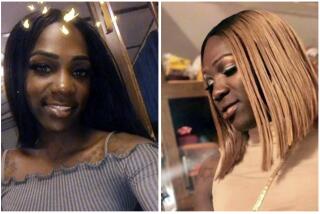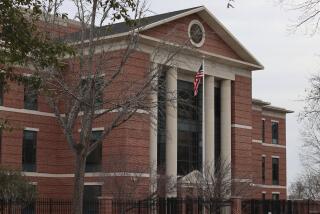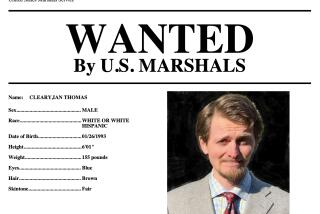Friend of alleged South Carolina church shooter Dylann Roof arrested by FBI
- Share via
COLUMBIA, S.C. The man who opened his home to Dylann Roof in the weeks before the June killings of nine African-Americans in a Charleston church has been arrested by the FBI.
Agents picked up Joseph “Joey” Meek Jr., 21, of Red Bank, while he was at work Thursday afternoon, his girlfriend, Lindsey Fry, told The State newspaper shortly afterward.
Meek called her on his cell phone as it was happening, Fry said.
“He just said, ‘They want to talk to me, but I think I’m going to jail,’ ” Fry said.
Meek lives in a trailer in Red Bank with his mother, two brothers and Fry, who is 19.
Meek was informed in an Aug. 6 letter from the U.S. Attorney’s Office in Columbia that he was a “potential target” of the federal criminal investigation into the slayings of nine parishioners at the historic “Mother” Emanuel AME Church in Charleston.
The letter stated that Meek was under investigation for possible misprision and allegedly making false statements to law enforcement. Both crimes are felonies.
Misprision, which in federal cases means the concealment of knowledge about a crime from authorities after or as the crime is being committed, carries a maximum sentence of three years in prison if Meek is charged with and convicted of that.
If Meek is charged with and convicted of making false statements, he could be facing up to five years in prison. That number rises to eight years when the false statements concern certain types of crimes, including international or domestic terrorism.
Meek told The State newspaper on Tuesday he does not believe he has committed any crime. He said he called authorities as soon as he saw Roof’s image on television in a video taken from a security camera at Emanuel AME Church. Roof had been staying off and on with the Meeks in the weeks before the shootings, playing video games and drinking cheap vodka, Meek said after the shootings.
Meek told The State reporters in late June that on June 10, while he, Roof and their friend Christon Scriven were getting drunk on vodka, Roof announced plans to carry out a mass shooting seven days later at the College of Charleston.
Though they thought the talk was drunken bluster, Scriven and Meek were concerned enough that they went out to Roof’s car and took Roof’s handgun, hiding it until they all sobered up, Meek said.
They gave it back to Roof at Fry’s urging, she told reporters in June. She said Meek was on probation and she didn’t want him to get caught carrying a gun.
Roof faces state and federal murder charges in connection with the June 17 shootings. A manifesto Roof allegedly published online said he went there hoping to start a race war.
Authorities said they were worried Roof had something even bigger planned after The State reported on an encounter Roof had with law enforcement just before he bought his handgun.
A Columbia police officer reported March 13 that he found part of an AR-15 assault rifle and six 40-bullet banana-style ammo clips in Roof’s car during a routine encounter in a downtown Columbia park. Roof told the officer he wanted to buy an AR-15, which is the semiautomatic civilian version of the U.S. military’s M16 fully automatic assault rifle.
It’s unclear what Meek is being charged with. Meek will be arraigned and charged at 10 a.m. on Friday at the federal courthouse in Columbia. A federal motion was filed Thursday in the Roof case by U.S. assistant prosecutor Nathan Williams but was sealed immediately by magistrate Judge Bristow Marchant. It’s unclear if it related to Meek.
Meek’s mother, Kim Konzny, who is 41, told The State on Thursday evening that she wasn’t surprised her son was arrested, saying that “everybody knew it was coming.”
But Konzny said she is angry and that her son has been unfairly targeted. Konzny said Meek would not have lied to federal investigators and that her son “deserves different.”
“I’m worried, but then I’m not worried because I know my son didn’t do anything wrong,” Konzny said. “He shouldn’t have gotten arrested.”
Meek told The State reporters on Tuesday he was concerned about the letter but said, “It doesn’t matter, because I know I didn’t do anything.”
For Meek to be found guilty of misprision, federal prosecutors would have to prove four things: that a felony had been committed, that Meek knew it had been committed, that Meek failed to notify authorities and that he took an “affirmative step” to conceal the crime.
Lying or misleading investigators or hiding evidence could constitute taking an affirmative step to conceal a crime, said Mark Moore, an attorney who spent more than 24 years as an assistant U.S. attorney in Columbia and now works at Nexsen Pruet in Columbia. Moore is not affiliated with the case.
Meek would not be found guilty of making false statements unless prosecutors prove he concealed or covered up a material fact or provided a false statement either orally or in writing to investigators.
What will influence Meek’s outcome is his level of cooperation, since he is potentially a key federal prosecution witness, a top South Carolina defense attorney said Thursday.
Because he spent time with Roof in the weeks leading up to the Charleston shootings, Meek would be able to share with a jury not only details of Roof’s actions before the crime, but a description of Roof’s state of mind and what he was saying, said attorney Jack Swerling of Columbia, who also is not affiliated with the case.
Swerling has more than 40 years of criminal defense work in both state and federal courts and also lectures frequently on criminal law.
Charging Meek does not necessarily mean that federal authorities are exploring ways to send him to prison, Swerling said.
On the contrary, federal prosecutors often will bring a charge against someone who is indirectly involved in a crime in order to make that person a better prosecution witness, Swerling said.
That’s because any key prosecution witness can be expected to undergo a grueling cross-examination by defense attorneys, and if prosecution lawyers have not brought out damaging information first to the jury during the direct examination, it can look like the prosecution was concealing something, Swerling said.
“The government is interested in having a hook in the witness and prosecuting him so he has credibility it’s not like giving him blanket immunity, which they don’t do very often,” Swerling said.
“It’s better for the government to get that information out first that the guy did make a false statement, that he did commit misprision of a felony but now he’s cooperating, he’s got a plea bargain and the witness has an expectation of being assisted by the government.”
In the Roof case, Swerling said, prosecutors will want to show “Roof’s state of mind through the statements that he made and the actions that he took,” and Meek “is in an excellent position to relate that to a jury.” Meek is in a position to be an excellent witness to those matters, Swerling said.
Roof’s defense attorneys will want to know if Meek made inconsistent statements to federal agents, and through the process of discovery, they will have access to FBI write-ups of every interview Meek gave the FBI, Swerling said.
“It’s prosecution strategy versus defense strategy,” Swerling said. “The government has all the reasons in the world to bring it out up front, because Roof’s defense lawyers will be trying to undermine his (Meek’s) credibility.”
(c)2015 The State (Columbia, S.C.)
Visit The State (Columbia, S.C.) at www.thestate.com
Distributed by Tribune Content Agency, LLC.
More to Read
Sign up for Essential California
The most important California stories and recommendations in your inbox every morning.
You may occasionally receive promotional content from the Los Angeles Times.













